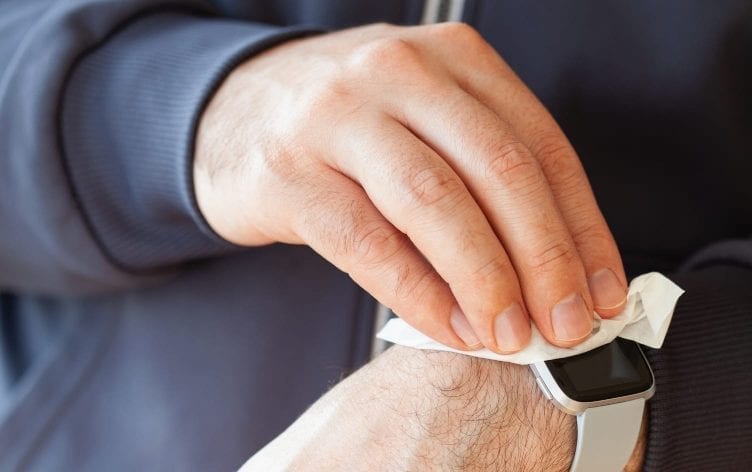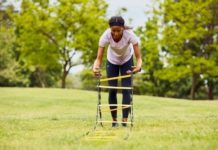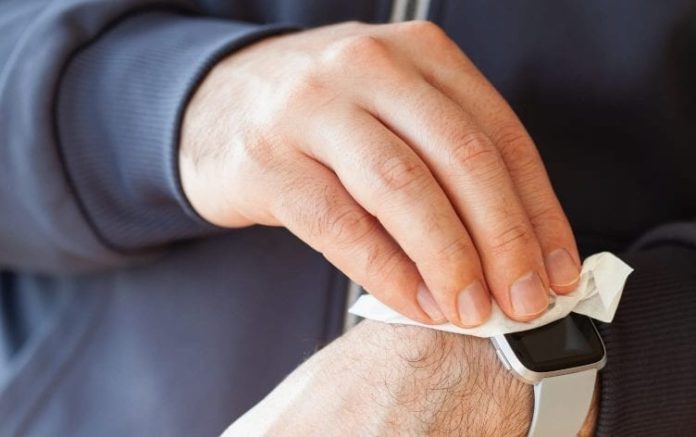
In the midst of stay-at-home orders due to COVID-19, thankfully, it’s still OK to take a walk while keeping a safe distance of at least six feet between you and other people (though, if you’re unsure about rules in your area or you’re part of an at-risk population, check the Centers for Disease Control & Prevention (CDC) website for the latest guidelines).
In practice, though, taking a walk outside during the novel coronavirus pandemic can be anxiety-inducing. You might be wondering: Could the virus land on your phone, fitness devices and shoes, and in turn, enter your body after you touch them and your face? If so, should you clean your gear every time you get home?
First, remember: “The novel coronavirus is mainly spread through person-to-person contact and respiratory droplets,” says Dr. Jonas Nilsen, who specializes in travel health vaccinations and infectious diseases. As such, social distancing should be your top priority. Still, emerging research shows the novel coronavirus can survive on surfaces, but whether or not you need to wash your watch, phone and shoes depends on what you encounter while on a walk.
CAN THE NOVEL CORONAVIRUS SURVIVE ON YOUR SHOES AND FITNESS DEVICES?
The novel coronavirus can survive on some surfaces such as plastic and stainless steel for up to 72 hours, so it could remain on your watch, phone and fitness tracker if they’re exposed to viral droplets, per a new analysis in The New England Journal of Medicine. As far as your shoes go, a recent study of hospital staff found novel coronavirus particles on the soles of half of their shoes — but this was in an intensive care unit and a COVID-19 ward, not your typical neighborhood walking path. Keep in mind, though: While these studies show the virus can remain on surfaces for a while, it’s not yet known how well the virus may (or may not) spread when picked up from these materials, says Dr. Natasha Bhuyan, a family physician and specialist in infectious diseases.
WHAT SHOULD YOU WASH AFTER A WALK?
The short answer is, it depends. “Unless you had close encounters with other people, you don’t need to wash your fitness devices and shoes after every walk,” says Paul Meechan, PhD, a biosafety consultant and former director of the Office of Safety, Health and Environment at the CDC. “Walking or running while maintaining social distancing would not put you at risk of picking up the novel coronavirus,” he says.
Of course, if you come into contact with other people (or could use some peace of mind), there’s no risk in disinfecting your phone and fitness devices when you get home, says Dr. Bhuyan. To avoid damaging them, don’t use bleach and check in with the manufacturer for specific cleaning instructions. In general, wiping them down with a 70% alcohol wipe or EPA-approved product like Lysol All-Purpose Cleaner should suffice (while not allowing moisture to enter openings), says Dr. Bhuyan.
For your sneakers, there’s no need to throw them in your washing machine after every walk (and brushing them off could potentially spread droplets if they were actually contaminated), says Dr. Meechan. “Instead, the best solution may be isolation and time,” he says. “You can leave your shoes outside of your home or in your garage for 72 hours,” suggests Dr. Bhuyan. If you go this route, you might want to have a couple of extra pairs so you can alternate without missing a workout.
THE BOTTOM LINE
“It’s important to remember that the risk of catching COVID-19 is not from just being outside, per se. The risk comes from being around other people or touching surfaces where the virus might be living, and then touching your face,” says Dr. Bhuyan. While more research is needed to know how the virus may spread from surfaces like your phone or shoes, taking extra precautions can help you and your housemates feel safer and deactivate any potential viral particles if they have landed on your phone or watch. After your walk, wipe down your devices and leave your shoes at the door. “Most importantly, scrub your hands with soap and warm water for 20 seconds,” says Dr. Nilsen.







